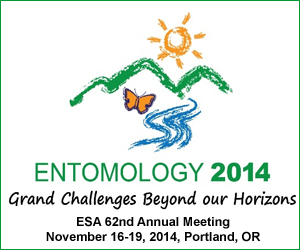Evaluation of natural product for protection of roses from japanese beetles (Popillia japonica Newman)
Evaluation of natural product for protection of roses from japanese beetles (Popillia japonica Newman)
Monday, March 10, 2014: 10:30 AM
Council Bluffs (Des Moines Marriott)
Japanese beetle (Popillia japonica Newman, JB) is a pest of many agricultural and horticultural plants. Neonicotinoids, like acetamiprid, are commercially available and labelled to protect roses from adult JB. When applied to flowers, these insecticides may come in contact with pollinators. Therefore, natural repellants or feeding deterrents that protect plants from defoliation while reducing the need for neonicotinoids may be beneficial. During 2013 we evaluated the effectiveness of a plant extract against JB on roses. We compared the extract to acetamiprid, a combination of the extract and acetamiprid, and water (control) applied to flowers and leaves of roses. Treatments were applied every 7 days for a total of four times during the season. Abundance of JB on leaves and flowers was measured three times a week for 6 weeks. We did not observe a difference in JB abundance on flowers across any of the treatments. We observed significant differences in the abundance of JB on leaves among the treatments (P=0.0226). Significantly fewer JB were observed on leaves treated with the combination of the extract and acetamiprid (5.4 beetles/plant) than leaves treated with water (31.8) or the extract alone (33.4). However, the number of JB leaves treated with acetamiprid alone (18.1) was not significantly different from plants treated with the combination of acetamiprid and the extract. Although the combination of the acetamiprid and extract was not significantly different from acetamiprid alone, the combination may be able to deter other insects such as pollinators from the plant and exposure to the insecticide.
See more of: B.S. Student Ten-Minute Paper Competition
See more of: Student Oral Paper Competition (Ten-Minute)
See more of: Student Oral Paper Competition (Ten-Minute)


